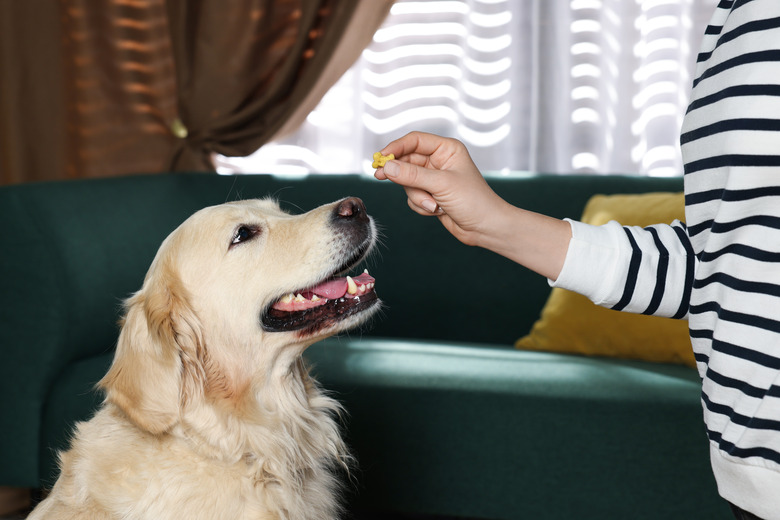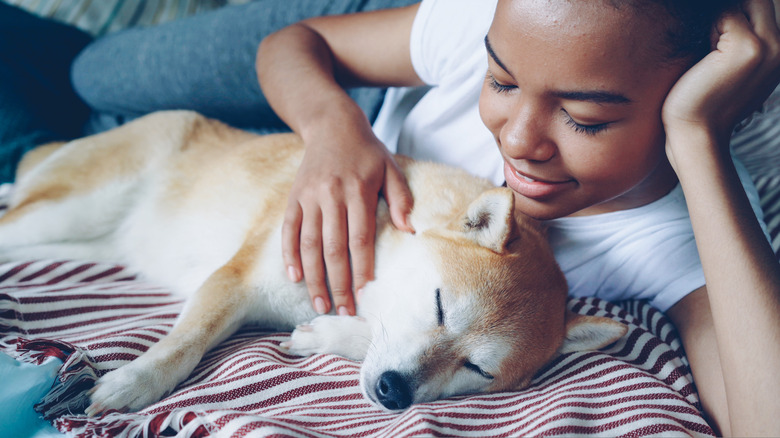Is Cocoa Butter Safe For Dogs?
You might use products containing cocoa butter, such as lip balm, sunscreen, and Palmer's cocoa butter lotion, to keep your skin soft and supple. But cocoa butter is also found in unsweetened, or baking, chocolate. While cocoa powder is toxic to dogs who eat it, small amounts of cocoa butter have little potential for toxic effects. It's more likely to cause digestive upset if your dog ingests enough of it. A small amount of pure cocoa butter or cocoa butter lotion to moisturize your dog's nose or paws is fine.
What is cocoa butter?
What is cocoa butter?
Cocoa butter is the fat that's extracted from the mature seeds, or cocoa beans, of the Theobroma cocoa plant. After the beans are removed from pods, they are fermented, dried, ground, and pressed. The pressing releases the fat we know as cocoa butter.
Theobromine
Theobromine is a compound found in the beans of the tropical cacao tree. It's a stimulant similar to caffeine that is also in cocoa, chocolate, coffee, and some teas. For dogs, it's a toxic substance. Baking chocolate contains the highest amount of theobromine. Dark chocolate has a higher amount than milk chocolate. White chocolate has little to no theobromine, but due to the fat content, it should not be given to dogs. In some dogs, theobromine can cause seizures and abnormal heart rate. In a worst-case scenario, it can be fatal.
Is cocoa butter toxic to dogs?
Is cocoa butter toxic to dogs?
Cocoa butter is toxic in extreme quantities but not in small or moderate quantities. Pure cocoa butter contains 140 milligrams of theobromine per kilogram. A small dog would have to eat 4 pounds of pure cocoa butter to cause death due to toxicity. But because cocoa butter is a fat, dogs who consume a lot of it will get sick to their stomach for 24 to 48 hours after ingestion.
For another perspective, 2 ounces of baker's chocolate, cocoa powder, or high-quality dark chocolate can be fatal for a 20-pound dog, but symptoms of poisoning can occur with ingesting as little as 0.4 ounces. Twenty ounces of a milk chocolate bar would be fatal for a 20-pound dog. White chocolate isn't a toxicity concern, but the fat and sugar can cause serious digestive upset, which could require veterinary care.
What should I do if my dog eats cocoa butter?
What should I do if my dog eats cocoa butter?
If your dog eats a few licks of cocoa butter (or cocoa butter lotion) off their nose, you don't have to worry. But if they ingest more, you should:
- Call a veterinarian to discuss whether vomiting should be induced or if you can "wait and see." They'll need to know how much cocoa butter your dog ate.
- Watch your dog for at least 24 hours after they ate cocoa butter or anything containing cocoa butter. It's possible they might have an upset stomach, like a bout of vomiting or some diarrhea.
- If your dog develops mild diarrhea and/or vomits once, put them on a bland diet of plain white rice and plain, skinless chicken breast until their symptoms resolve.
- If your dog vomits repeatedly or has bloody diarrhea, they need to be seen by your veterinarian right away.
- Other signs that your dog needs to go to the veterinarian immediately are fever, lethargy, not wanting to eat, muscle tremors, or a seizure.
- If you have questions about what your pet ate and what you should do, call your veterinarian's office or animal poison control.
Symptoms of chocolate poisoning in dogs
Symptoms of chocolate poisoning in dogs
If your dog ingests any amount of any type of chocolate, call your veterinarian right away. Symptoms of chocolate poisoning can range from mild to severe depending on a dog's sensitivity to theobromine, how much chocolate they ate, what type of chocolate it was, and the dog's body weight. Signs can appear within two hours of eating chocolate.
Symptoms of chocolate toxicity are:
- Vomiting
- Diarrhea
- Rapid heart rate
- Agitation or restlessness
- Increased thirst
- Increased urination
- Seizures
- Muscle tremors
- Death
Is cocoa butter lotion safe for dogs?
Is cocoa butter lotion safe for dogs?
Cocoa butter lotion is safe for dogs as a topical product. It's fine to apply cocoa butter lotion to your dog's paws and nose, but since pets tend to lick things off themselves and lotion contains additional ingredients that aren't meant to be ingested, consider using 100% cocoa butter. If you use the lotion instead, apply it in small amounts and allow it to absorb as much as possible before leaving your dog unattended.
Other options are coconut oil, olive oil, or shea butter. Any of these can be applied to your dog's nose or paw pads in small quantities. Shea butter, derived from the nut of the African shea tree, isn't used as a food. Because of its moisturizing properties, it is used in some canine hair conditioning products. The conditioning cream is used after shampooing and is rinsed out after staying on the coat and skin for a few minutes.
The bottom line
The bottom line
Cocoa butter, popular in lotions for dry skin, is the fat extracted from cocoa beans. Cocoa beans are also used to make chocolate. The reason chocolate is toxic to dogs is because it contains a compound related to caffeine called theobromine. The levels of theobromine is very low in cocoa butter, so you can safely apply a small amount to moisturize your dog's skin or nose. If your dog licks a cocoa butter skin care product off of their nose, they should be fine. If your dog ingests more than a few licks of lotion or pure cocoa butter, they might get an upset stomach. A dog who eats any amount of chocolate of any kind should be seen by their veterinarian right away. Symptoms of toxicity can develop in as little as two hours. If your veterinarian's office is closed, call a pet poison control center or a 24 hour emergency veterinary hospital.


